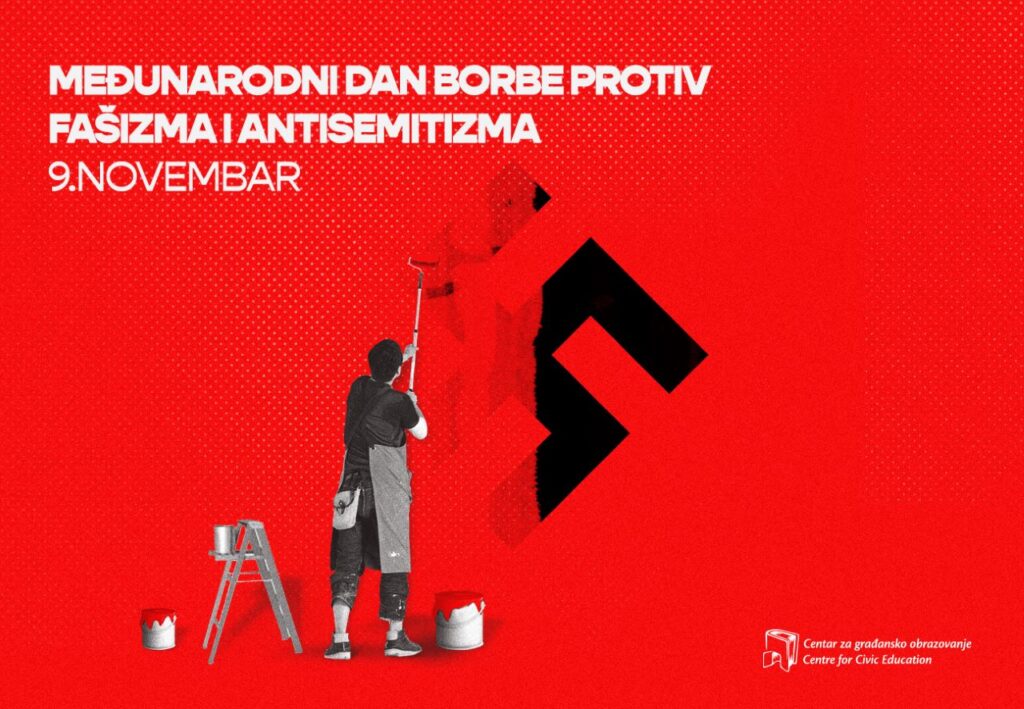Today, 9 November, marks the International Day Against Fascism and Antisemitism, commemorating “Crystal night” the 1938 event that symbolized the beginning of the mass persecution of Jews by Nazi Germany. The violence that erupted on German streets and squares that night signaled the onset of state-organized persecution and genocide, primarily targeting Jews, but also Roma and other groups. This physical violence was preceded by verbal hostility—the rise of antisemitism through hate speech paved the way for the systematic extermination of over six million Jews during World War II.
In Montenegro, the promotion of hatred through prejudice and misinformation directed at various minorities, particularly ethnic and religious ones, along with misogyny and religious fanaticism, is increasingly present. Responsible state authorities must actively oppose all forms of fascism and discrimination. In recent years, particularly concerning are the persistent efforts to revise history, seeking to blur the essential difference between fascist and anti-fascist movements—the former engaged in systematic extermination of people, while the latter defended them and fought against occupiers. Montenegro is, and must remain, firmly rooted in the anti-fascist legacy that underpins today’s democratic society, which must not be relativized, especially not by decision-makers.
We are witnessing a resurgence of nationalist narratives aimed at creating divisions along ethnic and religious lines, reminiscent of the dark 1990s and the wars in the former Yugoslavia.
We express deep concern over the state’s tolerance of inflammatory rhetoric, increasingly heard in public discourse. Particularly worrying is the warmongering and nationalist rhetoric from influential decision-makers, such as Member of Parliament and Mayor of Nikšić, Marko Kovačević, or the recent statement by Serbian President Aleksandar Vučić on the TV show Ćirilica. Such statements exacerbate tensions, radicalize society, and incite violence. Furthermore, the state has yet to address unregistered portals that fuel interfaith tensions, spread misinformation, and reinforce prejudices against minority groups, thus promoting hatred and violence. These “platforms of hate” echo the dangerous rhetoric of the 1990s.
Both society and the state must respond urgently to signs of rising tensions and divisions that could lead to new tragedies.
We call on decision-makers to refrain from hate speech and to intensify efforts to combat extremism and intolerance by strengthening institutional capacities for an effective response to these destructive phenomena. In this regard, we urge the President of the Administrative Committee, Jelena Nedović, to enable a vote on lifting the immunity of MP Kovačević.
We expect the state prosecutor’s office to act consistently in accordance with the law and respond to all forms of hate speech.
We believe it is essential to invest in building a society resilient to destructive influences, through consistent law enforcement and timely intervention. Only through responsible action can we preserve social cohesion and protect the fundamental values of anti-fascism, which are deeply rooted in Montenegro’s cultural heritage.
Non-Governmental Organizations (in alphabetical order):
Human Rights Action (HRA), Tea Gorjanc Prelević, Executive Director
Center for Democratic Transition (CDT), Milica Kovačević, Program Director
Centre for Civic Education (CCE), Daliborka Uljarević, Executive Director
Women’s Rights Center, Maja Raičević, Executive Director
Media Institute Montenegro, Olivera Nikolić, Director
Association Spectra, Jovan Ulićević, Executive Director

